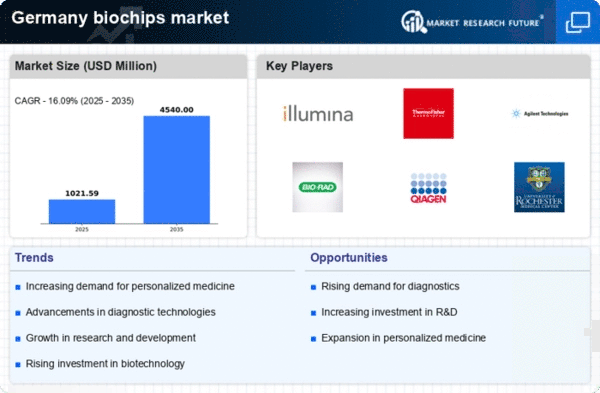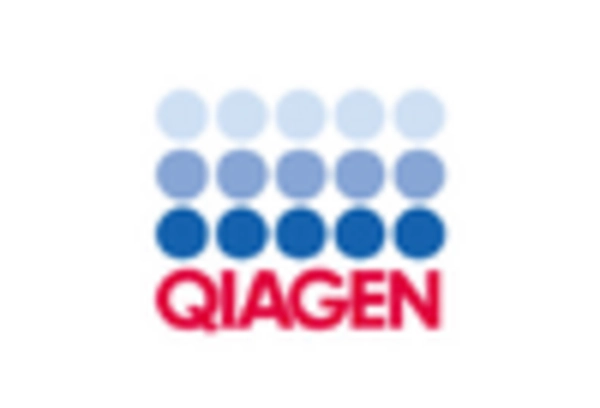Government Initiatives and Funding
Government initiatives in Germany are significantly influencing the biochips market. The German government has been actively promoting biotechnology and nanotechnology through various funding programs and grants. This support is aimed at fostering innovation and enhancing the competitiveness of the biochips sector. In 2025, public funding for biotechnology research is expected to reach €500 million, which could substantially boost the development of biochip technologies. Such initiatives not only encourage startups but also facilitate collaborations between academic institutions and industry players, thereby accelerating advancements in the biochips market.
Increasing Applications in Diagnostics
The biochips market in Germany is witnessing a significant increase in applications within the diagnostics sector. With the rising prevalence of chronic diseases, there is a growing need for rapid and accurate diagnostic tools. Biochips offer the capability to conduct multiple tests simultaneously, thereby streamlining the diagnostic process. The diagnostics segment is expected to account for over 40% of the biochips market by 2026, reflecting the critical role these technologies play in modern healthcare. This trend suggests that as healthcare systems evolve, the demand for biochips in diagnostics will continue to expand.
Rising Demand for Personalized Medicine
The biochips market in Germany is experiencing a notable surge in demand for personalized medicine. This trend is driven by the increasing recognition of the need for tailored therapeutic approaches that cater to individual patient profiles. Biochips, with their ability to analyze genetic information and biomarkers, play a crucial role in this paradigm shift. The market is projected to grow at a CAGR of approximately 15% over the next five years, reflecting the growing investment in research and development. As healthcare providers seek to enhance treatment efficacy, the biochips market is likely to benefit from this focus on personalized healthcare solutions.
Advancements in Research and Development
Research and development activities are pivotal in shaping the biochips market in Germany. The country is home to numerous research institutions and universities that are at the forefront of biochip innovation. Collaborations between academia and industry are fostering the development of next-generation biochips with enhanced functionalities. In 2025, R&D expenditure in the biotechnology sector is anticipated to exceed €1 billion, indicating a robust commitment to advancing biochip technologies. This investment is likely to lead to breakthroughs that could redefine applications in diagnostics and therapeutics, thereby propelling the biochips market forward.
Growing Focus on Environmental Sustainability
The biochips market in Germany is increasingly aligned with the growing focus on environmental sustainability. As industries seek to minimize their ecological footprint, biochips are being utilized for environmental monitoring and assessment. These chips can detect pollutants and analyze soil and water quality, contributing to sustainable practices. The market for biochips in environmental applications is projected to expand by 20% in the coming years, driven by regulatory pressures and public awareness. This trend indicates a potential diversification of the biochips market, as it adapts to meet the needs of environmentally conscious sectors.
















